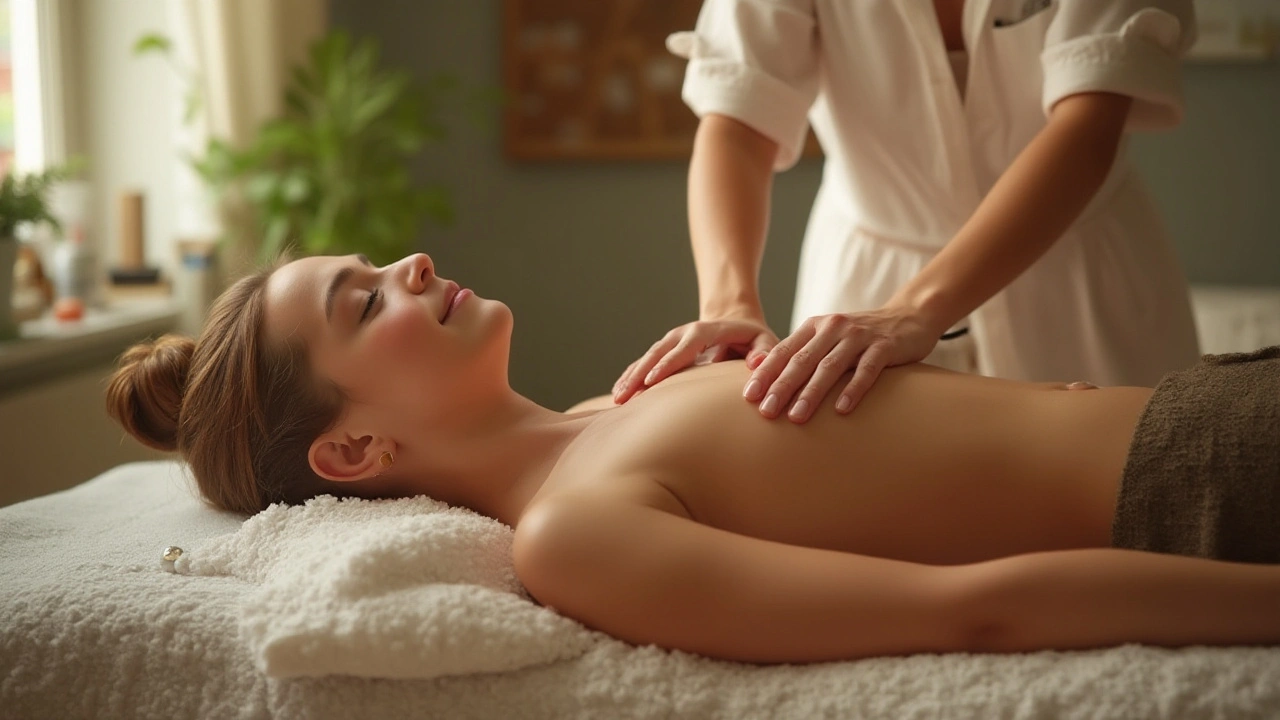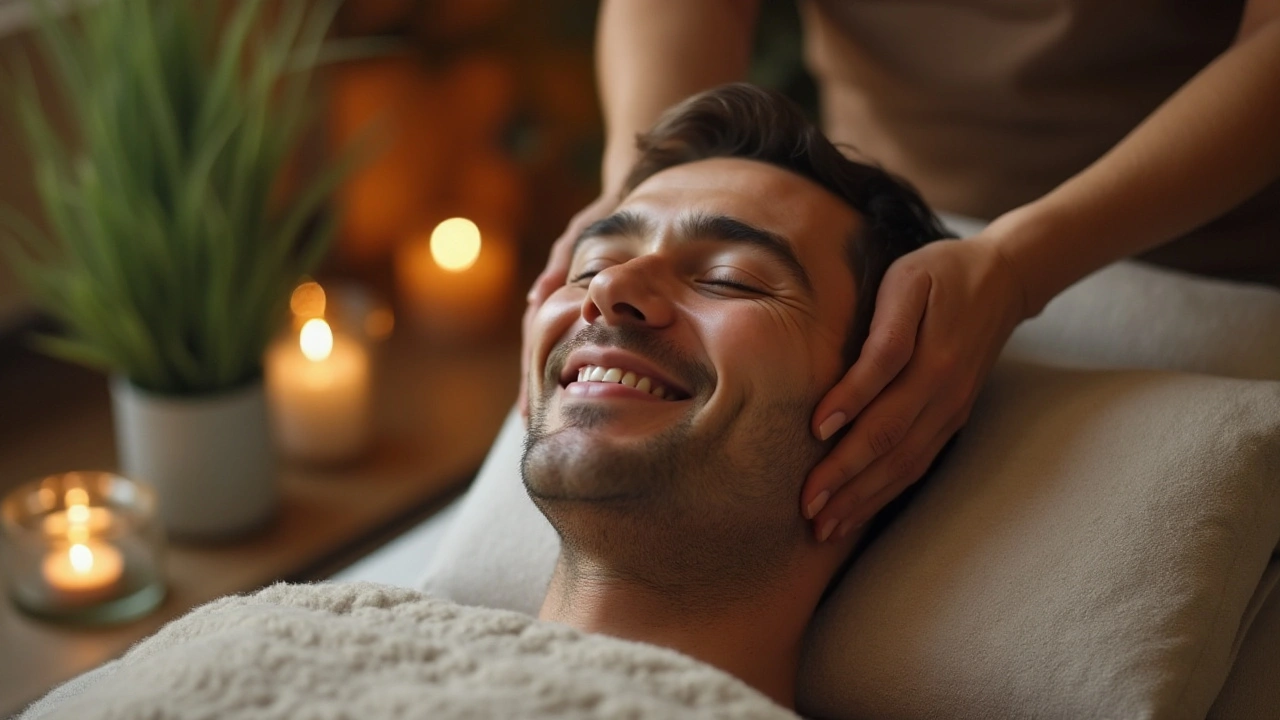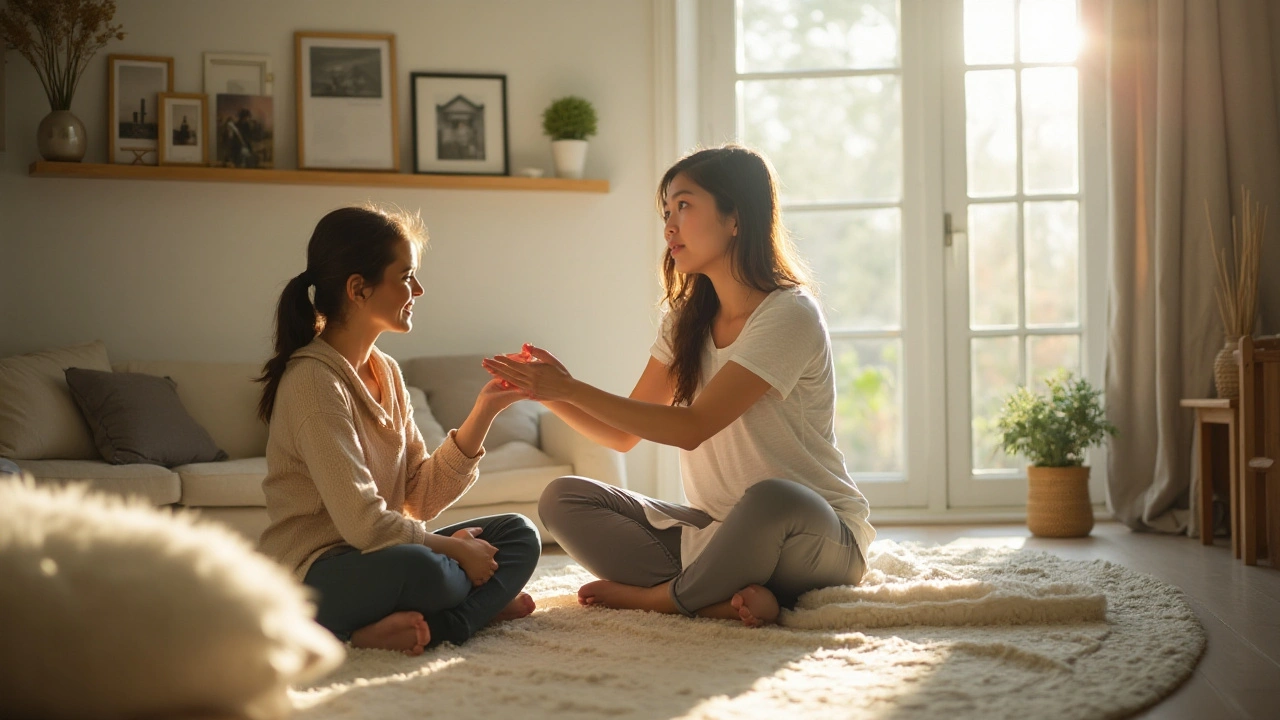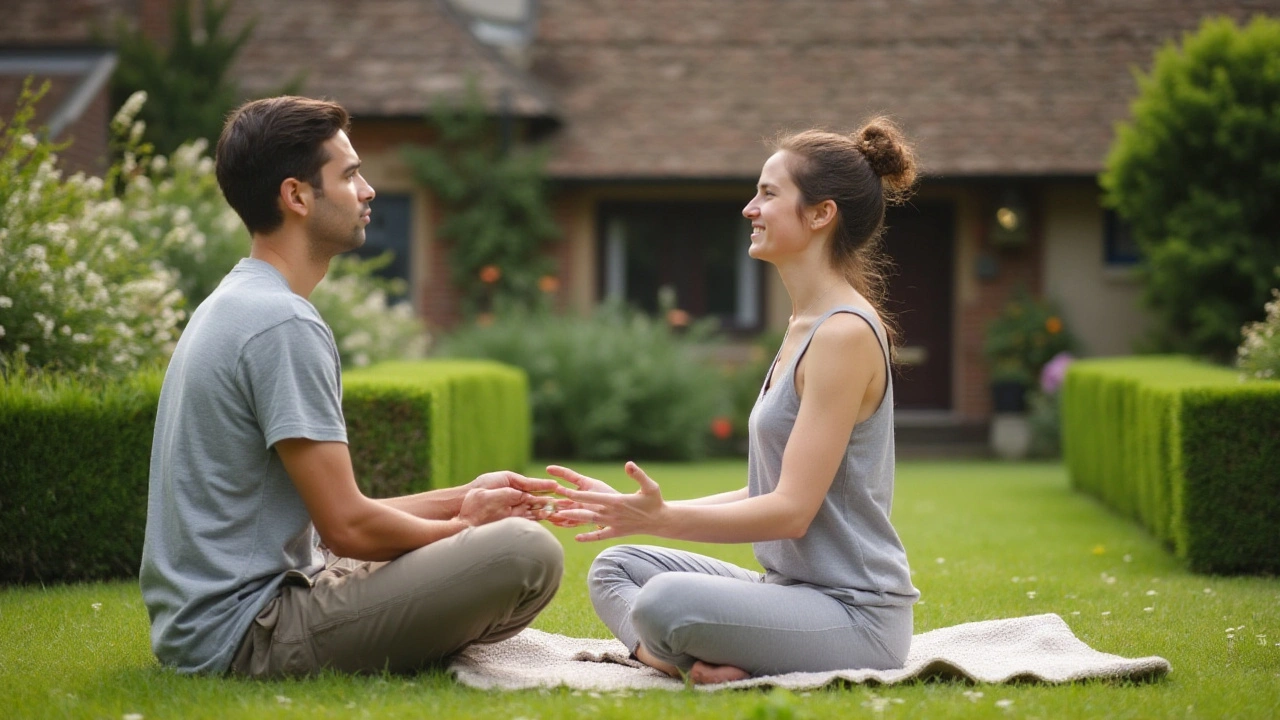The Incredible Benefits of Reiki Massage for Mental Health

- Sep, 18 2024
- 0 Comments
- Tessa Carlson
Reiki massage isn't just an emerging trend; it's an age-old practice that offers profound mental health benefits. Originating in Japan, this healing technique uses 'life force energy' to promote balance and relaxation.
Many people find that Reiki helps reduce anxiety, stress, and even symptoms of depression. It's a gentle practice that can fit easily into anyone's life, offering a sanctuary of calm amidst a busy world.
Whether you're looking to add a new dimension to your mental health routine, or simply curious about alternative therapies, Reiki massage might be worth exploring.
- Understanding Reiki Massage
- Mental Health Benefits
- Practical Tips for Incorporating Reiki
- Personal Stories and Testimonials
Understanding Reiki Massage
Reiki massage is a gentle yet powerful healing practice that has its roots in Japan. The term 'Reiki' comes from two Japanese words: 'Rei,' which means universal, and 'Ki,' which means life force energy. This healing technique revolves around the idea that an unseen life force flows through us, and it is this energy that keeps us alive and well.
The primary goal of Reiki massage is to promote harmony and balance in the body. During a session, a Reiki practitioner uses their hands to channel energy into the recipient's body. This process is believed to free blocked energy pathways, allowing the natural flow of life force to be restored. The touch can be light or even just above the skin, depending on the practitioner's style and the client's comfort level.
How Does It Work?
Many people wonder how simple touch or energy transfer can have any real impact. The practice works on the principle that when the 'life force energy' is low, we are more likely to feel stress or become ill. By boosting this energy, Reiki aims to improve not just physical health but emotional and mental well-being as well.
The setting for Reiki massage is typically serene, with soft lighting, soothing music, and a peaceful atmosphere. This helps to ease the client into a state of relaxation, making it easier for them to absorb the healing energy. Sessions usually last about an hour, but even a short 15-minute session can offer noticeable benefits.
According to Dr. Mehmet Oz, “Reiki is one of my favorites, we’ve been using it for years in the Oz family, and we swear by it”
Thanks to its non-invasive nature, Reiki is an accessible treatment for people of all ages, including children and the elderly. It has gained popularity in various fields of medicine, including oncology, palliative care, and mental health therapies. Practitioners note that even skeptics often leave sessions feeling more relaxed and centered.
The Science Behind Reiki
While Reiki massage has a strong spiritual component, it also has a growing body of scientific research backing its efficacy. Studies have shown that Reiki can lead to significant reductions in stress and anxiety levels. A comprehensive meta-analysis published in the Journal of Evidence-Based Complementary & Alternative Medicine found that Reiki offers a reduction in pain and anxiety, enhancing overall well-being.
| Benefits | Details |
|---|---|
| Reduces Stress | Promotes a deep sense of relaxation |
| Balances Energy | Restores natural energy flow |
If you are looking to explore or start benefiting from Reiki treatment, make sure to seek a certified and experienced practitioner. It is always beneficial to get recommendations or read reviews before committing to a session.

Mental Health Benefits
Exploring the world of Reiki massage can lead to a number of surprising mental health benefits. This ancient practice, rooted in the idea of harnessing 'life force energy', has been embraced by many for its potential to soothe the mind and elevate emotional well-being. Scientifically speaking, Reiki complements the body's natural healing processes, fostering an environment where mental clarity and emotional stability can flourish.
Stress relief is often the first noticeable benefit when incorporating Reiki into your routine. Many who practice Reiki report a significant reduction in daily stress levels. The calming effects are not merely subjective; several studies have indicated that Reiki can lower heart rate variability and reduce cortisol, a hormone directly related to stress. This can lead to a more balanced and composed state of mind.
In addition to stress reduction, Reiki massage has been found to alleviate symptoms of anxiety and depression. A study published in the Journal of Evidence-Based Complementary & Alternative Medicine observed that patients who received Reiki treatments felt less anxious and experienced improved mood levels. This makes it an appealing option for those grappling with these issues on a daily basis.
"Reiki can significantly improve quality of life for individuals suffering from chronic health conditions and emotional strain," says Dr. Ann Baldwin, a prominent researcher in the field.
Chronic pain often intertwines with mental health issues, perpetuating a cycle of discomfort and sadness. Reiki massage addresses this by channeling energy to affected areas, helping to ease the associated pain. This relief can often translate into a better mood and a greater sense of mental wellness.
| Benefit | Effectiveness |
|---|---|
| Stress Relief | High |
| Reduction in Anxiety | Moderate to High |
| Alleviation of Depressive Symptoms | Moderate |
| Chronic Pain Management | High |
One of the most unique aspects of Reiki is its ability to foster a deep sense of relaxation. Unlike conventional forms of therapy that may require extensive emotional work, Reiki provides a tranquil environment where the individual can simply relax and receive. This can lay the groundwork for more profound psychological healing over time.
Another fascinating benefit is the improvement in self-awareness and mindfulness. As Reiki helps to stabilize the mind, it brings about a clarity that can make individuals more attuned to their thoughts and feelings. This heightened awareness can aid in better managing emotional responses and making healthier life choices.
Whether used as a complementary therapy alongside traditional mental health treatments, or as a sole practice, Reiki massage holds tremendous potential. Its gentle, non-invasive nature makes it accessible for all, offering a sanctuary of calm and a means to foster lasting mental health and emotional balance.

Practical Tips for Incorporating Reiki
Integrating Reiki massage into your daily life can be a rewarding journey for your mental health. First and foremost, find a certified Reiki practitioner. A practitioner brings experience and the right energy, ensuring the sessions are effective. You can start with a simple search in your local area and read reviews to find one that suits your needs.
If you're more adventurous, consider learning Reiki yourself. Attending a workshop or taking an online course can give you a comprehensive understanding of this healing technique. Many people find that practicing Reiki on themselves daily, even if it's just for 10 minutes, brings them a sense of peace and balance. A small investment of time yields immense benefits.
Carving out a dedicated space in your home for Reiki practice can enhance your experience. Choose a quiet corner with soft lighting, comfortable seating, and calming decor. It's your personal sanctuary where you can disconnect from the daily grind. Adding elements like candles, essential oils, or soothing music can amplify the positive energy, making your sessions more effective.
Timing also matters when incorporating Reiki into your routine. Early morning and late evening are often the best times for practice. The quiet of dawn or the calm before bedtime provides the perfect setting for deep relaxation. Consistency is key here; regular practice leads to better results over time.
Incorporating Reiki doesn't have to be a solo journey. Sharing the practice with family members or friends can be immensely fulfilling. Practicing Reiki on each other can strengthen bonds and create a supportive, healing community. Plus, it’s a fantastic way to introduce your loved ones to the benefits of Reiki, enhancing everyone's mental well-being.
Don’t forget to document your Reiki journey. Keeping a journal where you note down your experiences, feelings, and observations can be insightful. Tracking your progress helps in understanding how Reiki is impacting your mental health over time. It's also a great way to stay motivated.
“Reiki is an energy technique that promotes relaxation, reduces stress and anxiety through gentle touch,” says Jill Thiel, a reiki master teacher based in Minnesota.
If you're looking to dive deeper, consider joining a Reiki community or support group. Many cities have local groups that offer sessions, share experiences, and provide updates on workshops or retreats. Engaging with a community provides additional support, knowledge, and a sense of belonging.
Finally, integrate the principles of Reiki into your life. They focus on gratitude, honesty, humility, compassion, and mindfulness. These principles can guide your daily actions and reactions, significantly enhancing your mental health. The core idea is to live in the moment and embrace positivity.

Personal Stories and Testimonials
Reiki massage has touched the lives of many individuals around the world. Let's delve into some personal stories and testimonials that highlight how Reiki massage has positively impacted their mental health.
One of the most compelling stories comes from Sarah, a 35-year-old teacher from Oregon. Sarah was battling severe anxiety and found it hard to manage her daily tasks. She tried several traditional methods but only achieved minimal relief. One day, a close friend recommended Reiki. Skeptical at first, Sarah decided to give it a try. She noticed a remarkable shift in her emotional state after only a few sessions. 'I felt a sense of calm and clarity I hadn't experienced in years,' Sarah shares. 'Reiki has been a life-changer for me.'
Similarly, David, a corporate executive, found solace in Reiki after enduring years of high-stress work environments. David reveals, 'I never considered myself a spiritual person, but Reiki was different. It offered a grounding experience that left me refreshed and clear-headed.' His favorite part about Reiki is that it's a practice he can seek out whenever he needs a mental break.
According to a study conducted by the International Journal of Behavioral Medicine, Reiki has shown promising results in reducing symptoms of depression and anxiety in patients. The study observed a noticeable improvement in the mental well-being of participants who had consistent Reiki sessions over eight weeks. This scientific backing lends credibility to the personal experiences of those who have benefitted from the practice.
Dr. Ann Baldwin, a researcher at the University of Arizona, states, 'Reiki activates the parasympathetic nervous system, which calms the fight-or-flight response. This physiological shift can significantly aid in stress management.'For some, Reiki offers an outlet for emotional release that is difficult to find through other therapies. Michelle, a young mother coping with postpartum depression, says, 'It was like a weight lifted off my shoulders after my first session. The emotional release was profound, and my connection with my baby improved.'
Another enlightening testimony is from Liam, a student who struggled with performance anxiety. Liam notes, 'Before I discovered Reiki, I felt paralyzed by fear before exams. The sessions helped me stay focused and calm under pressure.' For students like Liam, combining Reiki with other mindfulness exercises created a toolkit for managing stress effectively.
Reiki practitioners often witness these transformative changes firsthand. 'I've seen clients walk in with the weight of the world on their shoulders and leave with smiles,' says Maria, a seasoned Reiki practitioner who has been practicing for over a decade. Maria's experience adds an additional layer of credibility to the positive effects of Reiki on mental health.
Personal stories and scientific studies indicate a growing recognition of Reiki massage as a viable option for mental health care. It's no wonder more people are turning to this ancient practice to navigate through the complexities of modern life.